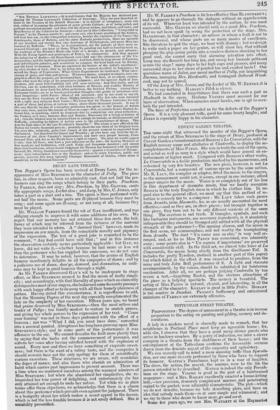"SIR THOMAS LAWRENCE.ŌĆöIt is, well known that his Majesty has
declined pur- chasing Sir Thomas Lawrence's Collection of Drawings. They are now therefore of- fered to the Trustees of the British Museum : or in default of acceptance, must run risk, either of becoming the prisoners of some private Cabinet; or of being exiled, and perhaps rescattered abroad: aud thus will the dearest wishes, and labour, and taste, and Munificence of the Collector be frustrate.ŌĆöAnd yet in this Collection, " Unequalled in Europe,".As Sir Thomas asserts it ; and every one, who knows anything of the Subject, will hear him out; in this Unequalled Selection, besides the Cartoons of Da Vinci,ŌĆöthe Rembruncits, those of Rubens, and the other Masterly productions, there are upwards of one hundred and twenty first rate drawings of Michelagnolo, and more than two hundred by Raffaello. "These, be it remembered, are the parents of their most re- nowned Paintings: nay have in them, What No painting can half so forcibly teach us, the workings of the Painter's MindŌĆöthe birth of a design; its growth, and advance; With the Young Sports and grotesques of Fancy, its companions. And then appears the balancing of doubtsŌĆöAll Marvellously scratched outŌĆöthe chiaroscuro of the Un- derstanding; and the lightning of inspiration : And how, Only by long labour of Exercise, and indefatigable patience, and resolution to conquer, the head hath won its Energy, and the hand its freedom. Here are explained the Secrets of the Artist's excellenceŌĆö by what strokes of luck, (that is, by being able to convert Accident to Substance,) he seized the Magic of Expression ; What Subtle Experiments he instituted: What inter- change of place, and time, and person. Whatever means, complex or simple, were em- ployed to effect his purpose, are developed here. We must here, or no where, contem- plate what were the steps of his progressive judgment; and the upward flight of Ima- gination, still more Self-Confident and still more unerring : And then lastly, and not till then, can be understood, with what boldness of Reason, and godlike Mastery of CircLanstance he drew forth his After-perfection, the finished Picture. Among these Elaborate Studies are to be found profoundest thoughtsŌĆöthe germs of inventionŌĆöbril- liant Imaginings : noble Forms : Ideas of Art universal : and in one word to say all, they are the First Creations of those Mighty Intellects.ŌĆöThe few who were favoured with a sight, may estimate their Value.ŌĆöWe know that Sir Thomas Lawrence for only a part of them, had given, at various times, above thirty thousand pounds. It was ill this way that the income of a lucrative profession was spent, to the honour of Artists that once were, and for the benefit of those to comeŌĆöNot, as certain Beasts Blatant de- famed him, in gambling, which he despisedŌĆöbut by completing one great collection ; the Fredera, as it were, between Mau and Nature; Necessary for a Scientnl history of Art ; that the Student may be informed how to enlarge its bounds, as did Buonarroti and Raffaello, extending its Sphere of Action even to the circumference of things. This was the high object of the late President's liberality." The whole is now offered to the Nation for twenty thousand pounds; probably about the one third of its Original Cost. Yet even this, relatively, petty Sum cannot at the present moment be requested from Parliament. Let therefore the liberal and Wealthy; all who have any Soul for the di- vineness of Art, their Country's improvement, and their own proper honour, Come forward Now, and Act as the Public have a right to expect. The plan we would suggest Is this: that All those, who have a just influence on the Arts ; the leading Members of Our Academy and Institution, with each Noble and Generous Amateur; and among them that Gentleman, whose sound Judgment Sir Thomas has honoured with his public farewell, Mr. Ottley, should now assemble themselves : appoint a Committee of Manage- ment: open subscription lists at the Bankers : and so by every Exertion, public and private, preserve this most Splendid Choragic Monument of Genius, where alone it should be, in the National Museum."


















 Previous page
Previous page